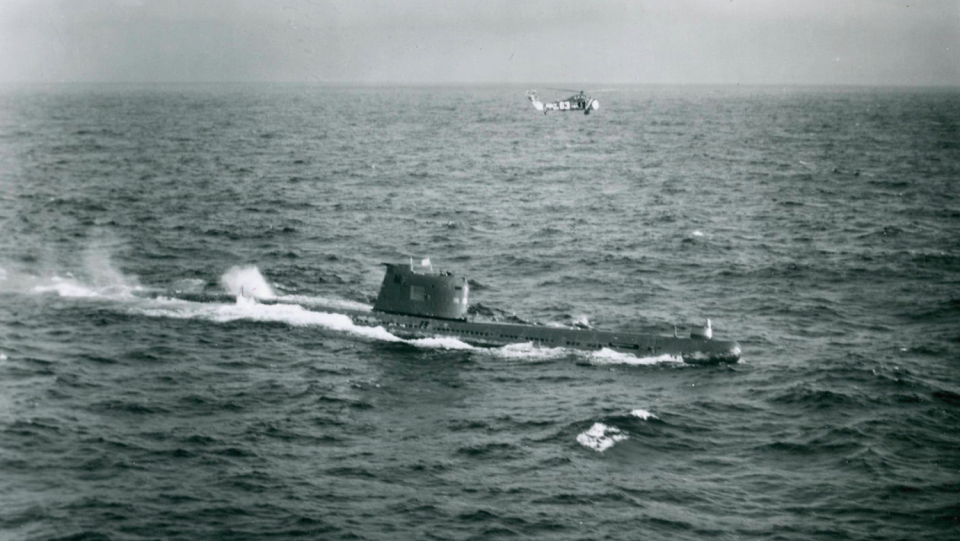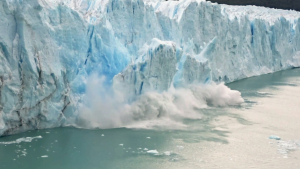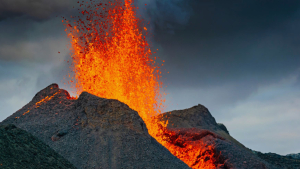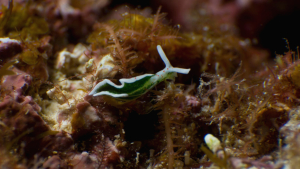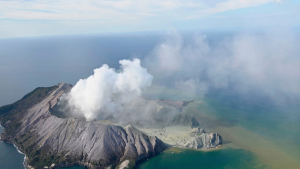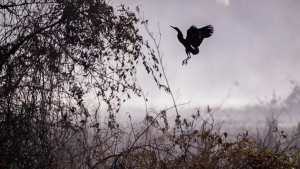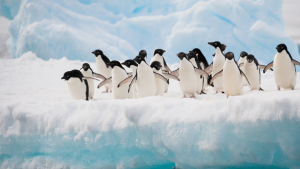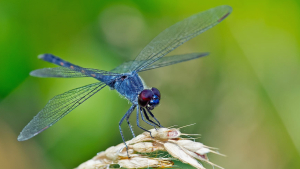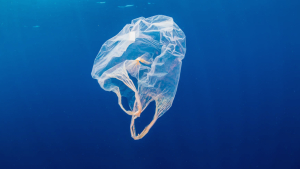The men had not received any messages for days. Their pursuers did not let them show up and so they could neither receive new orders nor listen to the enemy radio messages. Detonations constantly made the inside of the submarine tremble. The explosion noises intensified enormously due to the metal walls. "It felt," recalls the then Soviet radio officer Vadim Orlov, "as if you were sitting in an iron barrel and someone was continuously hitting it with a sledgehammer.«
Then a explosive load hit the submarine. "We thought - that's it - that's the end," reports Orlov in the book "The Cuban Samba of the Quartet of Foxtrots". The completely exhausted captain of the U-59, the only 35-year-old Walentin Grigorewitsch Sawizki, hadn't known for days what was going on on the water surface and got out of her way. "Maybe the war has already started up there, while we are beating trees here," he shouted angrily. Then he ordered to make the nuclear torpedo ready to shoot. “We'll chase her in the air! We will die, but we will sink them all - we will not become the shame of the fleet. «
About four weeks earlier, at four o'clock in the morning on October 1, 1962, four Soviet submarines had left the Sajda Bay about 60 kilometers north of the important Russian port city of Murmansk in full combat readiness. It was only on the high seas that the captains were allowed to open the envelopes in which the mission and destination of the voyage were located. The order was short: as part of the operation "Anadyr", the ships, in strict secrecy, were to go to the Caribbean Sea within a few weeks and set up a naval base there "to strengthen the defense of the island of Cuba" in the port of Mariel near Havana. Cuba had become a communist ally of the Eastern Bloc since the 1959 revolution under Fidel Castro. The world was in the middle of the Cold War.
The four 90 meters long and 7.5 meters wide were part of the Foxtrot class and were driven diesel electrically. Therefore, they had the disadvantage that the batteries had to be charged after a while what the submarine had to appear. Nevertheless, the flotilla reached the Atlantic unnoticed by Norway and Great Britain. But boats and crew were not prepared for the tropical climate. The high salt content and the heat in the boats caused people and machine problems. There were no air conditioning systems and no cooling system for the batteries. In addition, there was a significant lack of space, since in addition to the approximately 80-strong crew per ship there were also nine communication specialists on board.
Human wrong decisions were not foreseen
Walentin Grigorewitsch Sawizki could have triggered a nuclear war with the command to shoot the nuclear torpedo. The "balance of terror" between the USA and the Soviet Union should prevent the two superpowers from performing a nuclear strike. Because this would have always had a nuclear retaliation of the opposite side. However, this principle was not designed for human wrong decisions.
Under normal circumstances, the use of nuclear weapons was therefore only possible by order of the Soviet Minister of Defense. But in 1962 the command situation in the Atlantic was very diffuse. Most likely, the four submarines of the Soviet Northern Sea Fleet were among the first in their class to be equipped with nuclear torpedoes. In addition to the 21 conventional torpedoes on each of the four boats, each was equipped with an additional torpedo called a "special weapon". It had a range of 19 kilometers and had a nuclear warhead with a destructive power close to that of a Hiroshima atomic bomb.
"The only person who had talked to us about these weapons was the Vice Admiral," later one of the other captains recalled. “He said: 'In three cases, they should use them. First, when the enemy shot them under water. When he tears a hole in the fuselage. Second, above water. If you have to come to the surface and be shot on it and you get a hole in the fuselage. And the third case - if Moscow commands them to use these weapons. 'These were our instructions. And then he added: 'I advise you, commanders, that you first use the nuclear weapons and then find out what to do afterwards.'
Captain-Lieutenant Anatoly Petrovich Andreyev was part of the crew of one of the submarines. A letter to his wife is one of the few authentic descriptions of life on board the ships. In mid-October, Hurricane Ella surprised the submarines and caused some minor damage. "For two weeks, " Andreyev writes, they were "whipped around" by the storm and hardly found sleep.
"Everyone only talkes about thirst"
But the worst thing was the temperatures on board. "The heat is driving us crazy. Everyone is walking around in shorts and sandals, only the deck officer, for the sake of decency, puts on a navy blue jacket. In some of the departments it is hot up to 57° C. Even in the coolest place it is still 37 ° C." In addition, the men would have suffered from the extremely high humidity. "We all look like we've just come out of a steam room. Breathing is getting harder and harder." Drinking water was strictly rationed, only 250 milliliters per day per person were allowed. "Everyone is just talking about thirst. I feel weak all over my body. It's hard to write, the paper is wet with sweat.«
In addition, they did not receive any information about what was actually going on in the world. After more than two weeks at sea, the Soviet submarines received the command from Moscow on October 15 not to go to Cuba and wait for new commands. On the same day, American U2 spy spy flights had taken the first evidence photos of launch ramps and medium-range missiles in Cuba, which threatened the United States. The secret diplomacy in Washington and Moscow began to work behind the scenes. The beginning of the 13-day Cuba crisis.
But the Soviet submarines in the Atlantic Ocean were not informed about all this. The Russian radio operators could only follow the US radio news to get an idea. On October 22, for example, they heard John F. Kennedy's speech in which the US president informed the public about the Soviet nuclear missiles stationed in Cuba. He also discussed that the US government will impose a naval blockade on the island, which should affect all "offensive military equipment". "Ships of any kind that go to Cuba from any nation or port will be rejected if they have loaded assault weapons. In addition, Kennedy stressed that "any nuclear missile fired by Cuba against a nation in the Western Hemisphere is considered an attack by the Soviet Union on the United States, which requires a complete retaliatory response to the Soviet Union.«
While the Soviet Commander in Cuba was prohibited on the evening of October 22nd, even in the event of an attack or US invasion, the submarine commanders in the Atlantic received no message. The last command they had received from Moscow a week earlier was to patrol in the Sargasose lake under strict confidentiality. This sea area between Florida and the Bermudas should be part of the area shortly afterwards that Kennedy had declared a quarantine zone.
Huge communication problem between the superpowers
Especially here, 32 destroyers, four aircraft carriers and 385 aircraft and thus around 85 percent of the total US Atlantic fleet search for ships that wanted to break down or bypass the blockade. The focus was particularly on the Soviet submarines. Hunted on them. It was heard in the US radio, an invasion of Cuba was imminent and you have to prepare for a thermonuclear war with the Soviet Union. In Florida, the Russian submarine drivers heard, special camps for the Soviet prisoners were already being built.
The historian Bernd Greiner describes in his book "The Cuban Missile Crisis" the enormous communication problem that prevailed between the superpowers. Not only did Washington not inform Moscow about the exact coordinates of the maritime barrier until October 27, US Secretary of Defense Robert McNamara also changed the rules of the game in the meantime. "Contrary to the internationally applicable regulations, according to which the requirement to surface may only be given with sonar signals, McNamara ordered the use of small-caliber underwater bombs," Greiner writes. These "practice depth charges" had about the explosive power of a hand grenade, so they could hardly damage a submarine. Although the Soviet Navy Ministry was informed of this procedure – in order to avoid misunderstandings – Washington did not receive a confirmation of receipt, nor were the submarine commanders informed about it by Moscow. Also, those responsible in the USA did not know that the submarines on which they were now throwing their hand grenades were equipped with nuclear torpedoes.
"Well, our" friends', the Americans, took us well, "writes the Soviet submarine driver Andrejew to his wife. “You don't let our nose show us on the surface. They discovered us yesterday, but we were able to flee. Something has exploded somewhere, but at some distance from us, so we don't know how serious it was. But here, in the submarine, the situation is very serious. The men are noticeably worse, many are sick, pass out, have swollen feet and nobody can sleep in this tremendous heat. "
In this situation, as Andreyev describes, the nerves of the commander of his submarine "crumble". "He roars at everyone and torments himself. He is already becoming paranoid, afraid of his own shadow. It's hard to deal with him. I feel sorry for him and at the same time I am angry with him for his thoughtless actions." At about the same time, on that October 27, which was supposed to go down in history as Black Saturday, Soviet anti-aircraft missiles, contrary to orders from Moscow, shoot down a U2 reconnaissance aircraft over Cuba, killing the pilot in the process. The US Air Forces have already been in the DEFCON 2 alert state for a few days, just one stage away from a war mission. About 2952 US nuclear weapons on intercontinental ballistic missiles, submarines and bombers are ready to strike at any time.
A few hours later, the U-59 is finally discovered by the US Navy. The aircraft carrier Randolph and at least seven destroyers and about half a dozen accompanying ships take the submarine into the deficiency. "They drove around us and pulled the circle closer," later recalled Vadim Orlov, the radio officer of the U-59. At 5 p.m. local time, the first four to five exercise bombs are thrown onto the submarine. Then more in a quick episode. Gary Slaugther, a radio officer on one of the US destroyers, will later say in a US documentary: "We didn't want to kill them, we wanted to harass them, we tried to torture them passively."
The situation is scary under water. The batteries run out. "Only the emergency lighting worked and it was incredibly stuffy," said Orlov later. The weeks of physical and psychological tension require their toll. "One of the watchdog fainted, then the next one, then one third ... they fell like the domino stones." For hours, the men suffer. A appearance is out of the question, because this would have violated the command of the confidentiality of her mission. More than a confrontation with the US Navy seems to be afraid of their own military courts.
In this situation, Captain Savitsky gives the order to fire the nuclear missile. "The commander comes right after God," one of the other captains is said to have said, "that's the rules on a submarine." His order would have been carried out if Vasily Alexandrovich Arkhipov, chief of staff and commander of the fleet association, had not prevailed on U-59. While Sawitsky and another officer also entitled to vote are pleading for the shooting down, the 36-year-old, experienced submarine commander objects. No one knows if a war has already broken out. But Arkhipov induces Savitsky to let the U-59 show up.
No targeted attacks
When they climbed to the command tower of the submarine at around 9 p.m. to see what was going on on the water surface for the first time after days, the two commanders of low-flying naval flight finishes were around 20 to 30 meters and helicopters with lights Receive search lights. Shots are also said to have fallen, as Archipov explained in the only known public statement in 1997. These were probably phosphorus fire sets that the fighter planes offset to activate the photoelectric camera lenses.
According to the testimony of another submariner, at that moment Arkhipov again had to dissuade Savitsky from giving the order to attack. Since the signal officer, who was supposed to give the light signals, blocked the narrow stairs of the command tower with his equipment, Sawitsky could not go down immediately, and Archipov had a few more seconds to realize that the actions of the US Navy were not targeted attacks. He thus very likely prevented a world and nuclear war. Arkhipov later succinctly explained: "The commander was physically unable to give orders, he could not even understand what was happening.«
Shortly afterwards, Sawizki called for all provocations from his persecutors. But the submarine was still intensively photographed by the US Navy. At dawn, a jazz band played on one of the US destroyers and drove up threatingly close to the Soviet submarine. The crew is said to have thrown into coatos and cigarette boxes. It must have been humiliating for the fought Soviet sailors. The following day, the U-59 dipped again. US President Kennedy and Kreml boss Nikita Khrushchev diplomatically ended the crisis with a secret rocket exchange and the US waiver of an invasion of Kuba. Only one of the four submarines had escaped the hunt of the US navy. But no one else had worried as extremely as on the U-59.
"On October 27, 1962, a third world war was averted," Arkhipov's daughter, Elena Andryukova, writes in 2022 by personal request in an e-mail. "Now, 60 years later, the world is once again on the brink of a life-and-death nuclear catastrophe." Vasily Alexandrovich Arkhipov died in 1998, probably from the late consequences of a radiation accident on one of the first Soviet nuclear submarines. During his lifetime, he and the crew of U-59 were not celebrated like heroes. Only after the collapse of the Soviet Union did his courageous act become public. Elena Andryukova has already received several posthumous honors for her father. She is convinced that "common sense and common sense of all politicians in power will prevail over the use of nuclear weapons and over the devastating consequences of a nuclear catastrophe". In an earlier version, there was talk about the fact that a Soviet anti-aircraft gun hit an American U2, but it was an anti-aircraft missile. We apologize for this.







